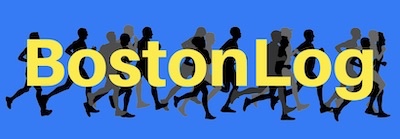I must have heard “wicked ‘stache, bro!” a thousand times, or “killer ‘stache,” “love your ‘stache, “Go Pre!” etc. Which is, as my good friend Eric Senseman confirmed, “The Dream.” Well, the dream for anyone who loves mustaches.
I grew up wanting a mustache my whole life, probably due to some combination of admiration for my mustachioed father and Steve Prefontaine (once I started running at age eleven). I couldn’t grow one until I was 23, but since then, I never go long without a ‘stache gracing my upper lip. Recently, I’ve let the ends grow out into a handlebar I sometimes wax, though it curls even if I don’t.
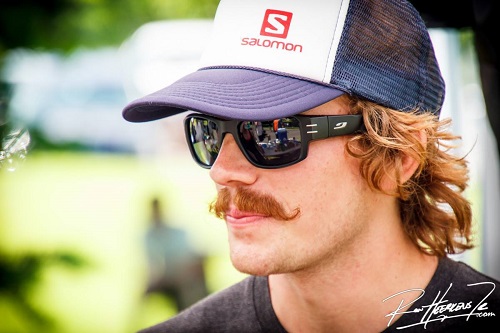
So why were so many people yelling about my mustache? Oh, right! Because I was running the Boston Marathon, a race whose crowds have absolutely unparalleled energy. I’ve run a decent number of big city marathons including Chicago, Berlin, and Dublin; and none of those came anywhere close to the feeling of Boston. It’s a race I’ve wanted to run for a long time, and one which most runners (even non-runners) will ask you if you’ve run, as soon as they find out you run marathons.
Despite running my first marathon in Missoula in 2007 (in 2:52 for second place while nursing a bum knee), I had delayed entering Boston until 2014, because I wanted to be competitive. The race has a history like no other, and I wanted to respect its competitive tradition by being ready to run a personal best when I first toed the fabled start in Hopkinton. After winning the Napa Valley Marathon on March 4th, where I ran a somewhat-slower-than-expected 2:26:15, I wasn’t so sure I’d be ready for that marathon PR just seven weeks later. But a couple of a solid workouts and a 5k road PR had me feeling confident to take down my three-year-old marathon best of 2:22:53.
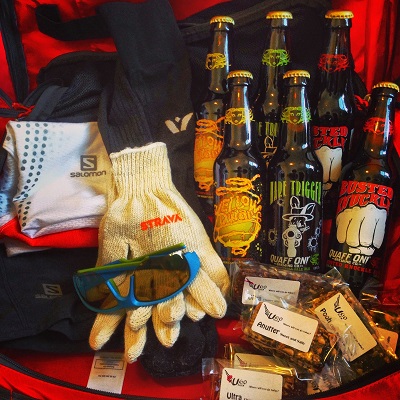
The tricky part of that goal was I was actually building up for a pair of ultra marathons right after Boston: the Ice Age Trails 50 Mile in May and the Cayuga Trails 50 Mile (the year’s USA Trail 50 Mile Championship) in June. So I didn’t do any true marathon specific work in my Boston buildup (which I believe is absolutely essential to run your best), and I didn’t really peak/taper either. But I’ve found one benefit of running ultra marathons is I’ve become much better at grinding it out in a road marathon. I just really don’t seem to blow up anymore. (Famous last words, right? Don’t worry, I’m sure I’ll eat them soon…)
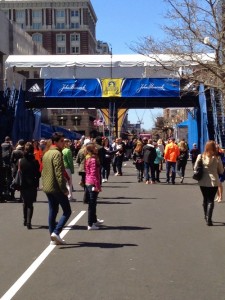
So it was with much excitement and anticipation I made my way to Boston for Patriots Day. I knew a fair number of athletes racing, including Julbo teammates and fellow ultra runners Ian Sharman and Mike Wardian, a number of friends from my Chicago days, my former coach Dave Walters (masters runner extraordinaire, who ran a 2:43:33 at age 58!), and two athletes I coach (unfortunately, one had some GI and cramping issues yielding a rough day, but the other knocked out a big three-minute PR of 2:41:19!).
Race morning dawned crisp and clear, and I headed to Hopkinton along with the 36,000 other runners taking part in the race. As I made my way to the front of Corral 1 for the 10 a.m. start, the nervous energy was palpable. I lined up about three rows deep and waited for the elite runners to come by. (The elite athletes line up about 100 feet in front of Corral 1. They have their own staging area and don’t have to line up until the last minute.) Meb Keflezighi, Ryan Hall, and the rest of the elites arrived, and after a few announcements and the national anthem, we were off.
The Boston Marathon is a net-downhill course, and the majority of that elevation loss comes in the first several miles. We were out quickly. I hit a 5:19 first mile (actual gun time 5:25 due to the offset non-elite start) and tried to settle into marathon rhythm. The noise and energy coming from the crowds was very high. I couldn’t really hear myself breathe, but I saw splits of 5:21, 5:13, and 5:07 for the next three miles. Around mile 7 or 8, I realized I was roughly on pace for the Olympic Trials qualifying standard of 2:18:00 (5:15/mile). However, I knew even running a steady effort, Boston is a positive split course and a 2:18:00 wasn’t in the cards just yet. I did, however, think a sub-2:20 might be possible.
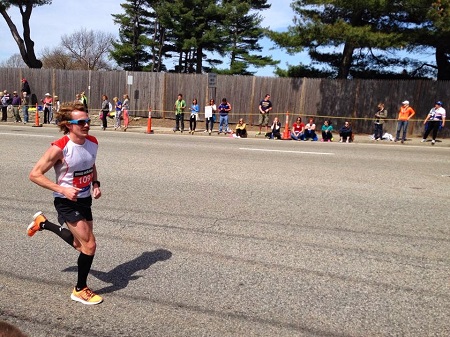
I found myself running solo essentially the whole race, picking guys off in front of me as they dropped one by one from a couple of loose packs. Running from behind is a great way to run as it helps keep you engaged and focused on the moment and your current effort, rather than thinking about all the miles ahead. People cheered for “109,” the number on my red bib, as I passed elite runners with yellow, two-digit bib numbers. This bib color difference probably made me an underdog to strangers, and who doesn’t like an underdog? But more so, I was buoyed by the countless people cheering for the ‘stache. It gave me an instant identity to strangers, and it’s nice to hear people say something positive you know is directed specifically at you, as opposed to a generic “Great job!” that could be meant for anyone. In crowded spectator sections of the course, it was literally every few seconds I heard some sort of ‘stache comment. The college-aged crowds especially dug it.
As I rolled into Wellesley, I encountered the well-known loudest cheering section of the course, due to the private all-girls Wellesley College. The roar from the ladies of Wellesley was deafening, and I saw many signs to the effect of “Kiss me, I’m single! (And legal!)” I was passing a couple of guys here, and I put in a slight surge to get ahead so I could move over to give high fives to the girls lining the course. It was impossible not to feed off their energy.
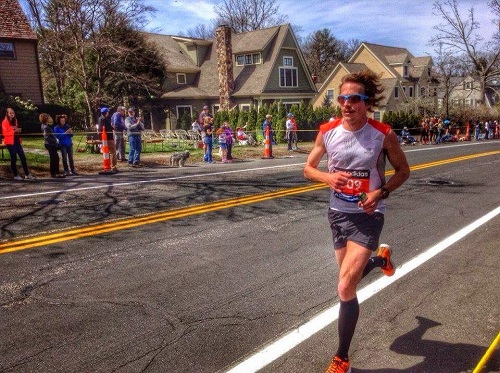
I soon hit the half marathon mark with a 1:09:30 split, which is about perfect for a projected time of 2:20. A positive split of a minute to a minute and a half is what one can expect if running evenly at Boston, due to the difficult Newton Hills from miles 16 to 21. The packs of runners in front of me had strung out by this point, and I just kept working on whoever was next. One runner who had been in my sights from the start was forty year old Mike Wardian from Arlington, Virginia, running in his ninth Boston. Mike’s a tough runner and a great dude who I’ve raced a number of times. I could see his pony tail and bobbing, backwards turned, white hat bobbing about 15 to 30 seconds in front of me for the entire race, and he just kept on moving while everyone around him faltered.
As we moved into the Newton Hills, Mike finally started to come back to me just a bit. Somewhere around the third climb, I caught him, told him to keep up the good work, and ran with him for a few minutes, appreciating someone to run with on the hills. While I moved a bit ahead, Mike held on well for a 2:23:32 finish, seven spots back and third place in his age group.
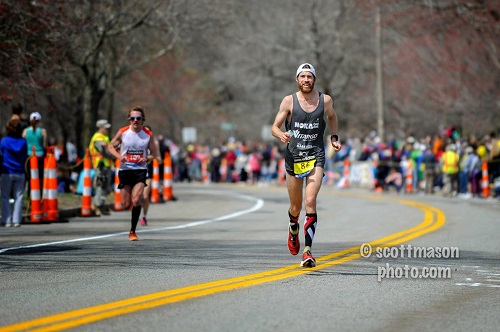
As I climbed Heartbreak Hill, I thought: This is such a little hill, but it sure hurts right now. Compared to the hills one encounters in most ultras, or even on my training terrain in Bloomington, the Newton Hills are really quite benign. But they sure don’t feel that way late in a marathon, when every second counts. Cresting that final climb, I saw my 21st mile split was a 5:51, my slowest mile of the day. That put a dent in my time to be sure, and when I saw 1:58:16 for my aggregate time at mile 22, I knew a 2:20:XX was going to be tough. I would need to run roughly 5:25s to the finish to dip under 2:21.
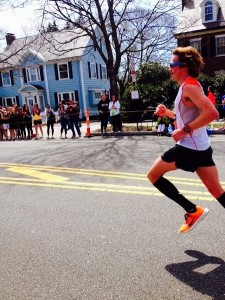
I used the downhills to my advantage from mile 22 to 24, letting loose and taking the opportunity to give out some more high fives as I passed throngs of screaming 20 year olds near Boston College. The descent in those miles is a great reprieve following the Newton Hills, but the last couple of miles of the course are basically flat and by that point, you are completely spent. I was slowly working up to a couple of runners in front of me, when I got passed for the first and only time during the race. It was Kevin Havel, a former Illinois prep stud, who ran an incredibly impressive negative split to finish in 2:20:55. He must have been quite relaxed those early miles!
The good thing about getting passed was it kicked my ass into gear a bit. I was hurting a lot, but I found a few more seconds in me to chase down the two runners in front of me (Havel excluded). I clawed my way to a 5:22 split for the 25th mile, but still faded a bit to a high-5:30s split for mile 26. By that point, I knew I wasn’t going to dip under 2:21, so I enjoyed the last stretch on Boylston Street, clocking a final time of 2:21:20 and breaking my old PR by 1:33. I was 32nd overall, 28th male, and 15th American.
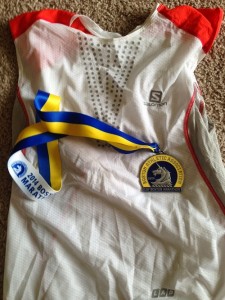 The first thing I heard when I crossed the finish line was “We’ve waited a long time for this…” I couldn’t believe it, for the first time since 1983, an American male winner at Boston! Standing just a few meters past the finish line, I turned around to see Meb Keflezighi atop the podium as the National Anthem began.
The first thing I heard when I crossed the finish line was “We’ve waited a long time for this…” I couldn’t believe it, for the first time since 1983, an American male winner at Boston! Standing just a few meters past the finish line, I turned around to see Meb Keflezighi atop the podium as the National Anthem began.
What an incredible outcome for the 118th Boston Marathon. It was of course an emotional day for many in Boston, and in the running community in general, given last year’s bombings. To have Meb end the 31 year drought of American winners on the men’s side was pretty incredible. Nobody deserved it more than Meb. He has led an incredible life, and after this race, I believe he has cemented his place among the best American marathoners of all time. With his ’04 Olympic Silver Medal, and NYC and Boston Marathon titles, he’s done it all.
I had a really great experience at my first Boston Marathon. It’s a race unlike anything I’ve done, and I look forward to coming back, hopefully many more times. That Olympic Trials Marathon standard of 2:18:00 is still out there…
Matt Flaherty
Bloomington, Indiana
April 21, 2014
Age – 28
Bib # 109
2:21:20
[Matt Flaherty is a professional runner, personal running coach, and freelance writer who loves racing all distances and terrains, although the 50 mile distance is his forte. He was the U.S. 50 Mile Road National Champion in 2013. His blog/website may be found at runflaherty.com.]
